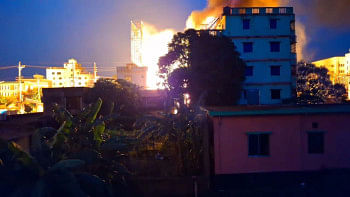COP28: Over 110 nations commit to triple renewable energy

More than 110 nations pledged to triple the world's renewable energy within seven years at UN climate talks Saturday as the United States pushed to slash methane emissions and boost nuclear capacity.
With smoggy skies in Dubai highlighting the challenges facing the world, leaders at the COP28 conference threw their support behind voluntary pledges aimed at ramping up alternatives to fossil fuels.
A massive deployment of solar, wind, hydroelectric and other renewables is crucial to efforts to displace demand for planet-heating coal, oil and gas and achieve net-zero carbon emissions by 2050.
The nearly 200 nations negotiating a COP28 climate deal face tougher talks over the next two weeks on the fate of fossil fuels.
More than half signed up to a commitment to tripling global renewable energy capacity and doubling energy efficiency by 2030, the COP28's Emirati presidency said.
But major oil producers including Russia, Saudi Arabia and Iran, and top consumer China were not on the list.
"I do need more, and I'm kindly requesting all parties to come on board as soon as possible please," COP28 president Sultan Al Jaber told delegates.
"This can and will help transition the world away from unabated coal," said Jaber, who also heads the UAE's national oil company and a renewable energy firm.
Clean power advocates welcomed the commitment but said it must be accompanied by the phase-out of dirtier forms of energy.
"The future will be powered by solar and wind, but it won't happen fast enough unless governments regulate fossil fuels out of the way," said Kaisa Kosonen, the head of Greenpeace's COP28 delegation.
Jaber also announced a pledge by oil and gas companies representing 40 percent of global production, including his UAE firm ADNOC and Saudi giant Aramco, to decarbonise their operations by 2050.
But the pledges do not include emissions when the fuels are used by their customers, and were criticised for repackaging previous, nonbinding commitments.
"This charter is proof that voluntary commitments from the oil and gas industry will never foster the level of ambition necessary to tackle the climate crisis," said Melanie Robinson of the World Resources Institute, a nonprofit research body.
'Destructive' methane
The US Environmental Protection Agency announced earlier that it would tighten curbs on methane emissions from its oil and gas industry.
The new standards would phase in the elimination of routine flaring of natural gas produced by oil wells, and require comprehensive monitoring of methane leaks from wells and compression stations.
The announcement came ahead of an expected methane summit led by the world's biggest greenhouse gas emitters -- the United States and China -- along with the United Arab Emirates at COP28.
China agreed for the first time to include all greenhouse gases in its next national climate pledge for 2035 in an agreement with the United States last month.
Methane is responsible for about one-third of the warming from greenhouse gases occurring today, second only to fossil fuels.
Agriculture is responsible for a quarter of methane emissions, with most of it produced during digestion by livestock.
The energy sector is the second-largest source of human-caused methane emissions.
Methane "is the most destructive gas", US climate envoy John Kerry said.
Nuclear option
While COP28 rallied behind renewables, the United States led a call by more than 20 nations for the world to triple nuclear energy capacity by 2050.
In a declaration, countries ranging from Britain to Ghana, Japan and several European nations said nuclear power played a "key role" in the goal of achieving carbon neutrality by mid-century.
The use of nuclear power as a cleaner alternative to fossil fuels is highly controversial, with many environmental groups warning about safety risks and the disposal of nuclear waste.
"We are not making the argument to anybody that this is absolutely going to be a sweeping alternative to every other energy source," Kerry said.
"But we know because (of) the science and the reality of facts... that you can't get to net zero 2050 without some nuclear," he said.
Environmental group 350.org said the 2011 Fukushima nuclear disaster in Japan highlighted the dangers of atomic power.
"We don't have time to waste on dangerous distractions like nuclear energy," said its North America director Jeff Ordower.
The announcements came as more than 50 world leaders took the stage at COP28 for the second day in a row, though US President Joe Biden and Chinese leader Xi Jinping are skipping the talks.
US Vice President Kamala Harris announced a $3 billion contribution to a global fund to help developing countries with the energy transition and the effects of climate change -- its first pledge to it since 2014.
"Today, we are demonstrating through action how the world can and must meet this crisis," Harris said.

 For all latest news, follow The Daily Star's Google News channel.
For all latest news, follow The Daily Star's Google News channel. 



Comments